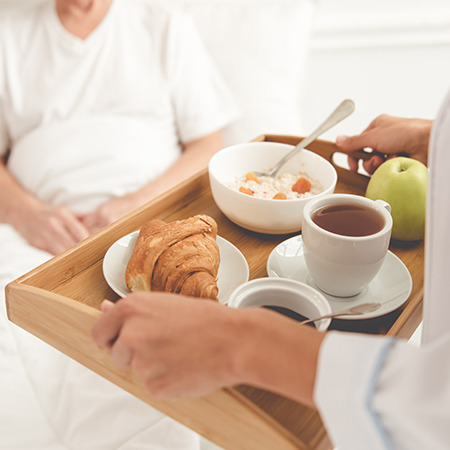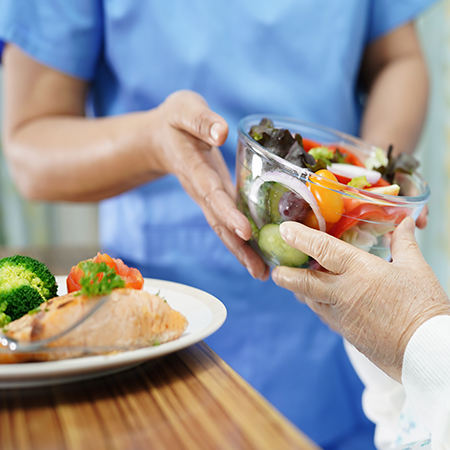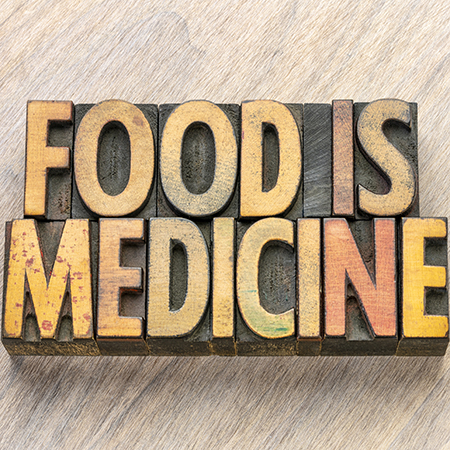The conclusions and recommendations of the long-awaited Hospital Food Review have been published today (October 26), with a focus on ensuring the nutritional needs of patients and staff are met safely, at all times, with choice and high-quality food and drink.
There is also recognition that funding is necessary to improve the catering facilities, as well as in staff training and support to provide hospital caterers with the essential tools to achieve these objectives.
The review was led by restaurateur, celebrity chef and TV presenter, Prue Leith, and chaired by former National Chair of the Hospital Caterers Association (HCA) and catering lead for Taunton and Somerset NHS Foundation Trust, Phil Shelley, with a board comprising professionals from within the NHS, the Department of Health and Social Care, British Dietetic Association, NHS England & Improvement, the HCA, Food Standards Agency, Defra and the Soil Association.
Phil and Prue visited catering managers, staff and patients across the country, looking at best practice from those leading the way in NHS food quality and innovation. The findings of the Review echo many of the themes in both the government’s recently published Obesity Strategy and part one of the National Food Strategy, in which Henry Dimbleby as the strategy lead, described the British diet as a “slow-motion disaster.” Commenting on this Review he said hospitals must be a “guiding light” for change.
Henry adds: “This is a refreshingly innovative review which not only offers solutions for hospitals but offers three principles that any institution could use to improve their food: realise that leadership, not decree, is what creates change, put in place a ‘whole-institution’ approach, and focus not just on the food, but on the food culture, ensuring that everyone from the board members to the patients are eating from the same kitchen. But most of all - with its Power of 3 approach - it puts love, care, and humanity at the centre of any solution.”
Recommendations
Eight recommendations have been accepted to improve the health and wellbeing of patients and staff through the food they are served in hospital:
Catering staff support: Introduce professional qualifications and standards for hospital caterers, provide more training and reward excellence with pay progressions
Nutrition and hydration: Ensure importance of food services is understood and integrated within patient recovery, hospital governance and staff training
Food safety: Ensure food safety through open communication channels to address safety concerns, by appointing food safety specialists and upholding standards
Facilities: Provide funding to equip and upgrade hospital kitchens, provide 24/7 services for staff and patients, prioritise providing health-enhancing meals
Technology: Every hospital should implement a digital meal ordering system by 2022 to collate food choices, manage allergies and diets, and minimise waste
Enforcing standards: Food and drinks standards should be statutory and inspected by the CQC, a forum should be established to share exemplary best practice
Sustainability and waste: Ensure government food procurement standards are upheld, NHS trusts should agree a common method of monitoring food waste
Going forward: Establish an expert group of hospital caterers, dietitians and nurses to monitor progress, accountable to the Secretary of State for Health and Social Care.
Matt Hancock, Secretary of State for Health and Social Care says: “This pandemic has demonstrated more than ever the importance of good food and proper nutrition. We must all prioritise our health and be empowered to eat well, whether we’re at home or in hospital. This impressive report shows the way to good hospital food for all - patients, staff and visitors.”
Phil Shelley says: “Just as our staff need the right tools to do their job, we also need to ensure that they have the nutrition and hydration they require to perform their crucial roles.
“The wellbeing of our NHS staff is vital because it affects their mental and physical health as well as the quality of care they deliver for patients. A lack of nutritious food and drink can contribute to feelings of stress and lack of control in the workplace.”
Prue Leith says: “The review provides best-in-class examples of how hospitals can serve delicious, nutritious and nicely presented meals on a budget. Food is not only important to health, but to morale. Hospital mealtimes should be a moment of enjoyment and a pleasure to serve. They should inspire staff, patients and visitors to eat well at home.”
The HCA has welcomed the Review and its recommendations. National Chair, Craig Smith says: “We recognise that every model of food delivery is important, and I am delighted to see the review has adopted many of the HCA’s core platforms and puts food at the heart of the service. It recognises and agrees with our campaigns such as the Last Nine Yards, Power of 3, Nutrition and Hydration 24/7, the focus on the patient experience and the underlying need to ‘get it right’ at the point of service. Most importantly, like the HCA, it recognises that food is a fundamental and important part of a patient’s recovery.
“The review recommends every hospital should have at least one member of the HCA, that catering budgets should be ringfenced, and leadership engagement from executive stakeholders is paramount. The HCA endorses these recommendations. We already know from our members, that Trusts which have a high level of chief executive engagement have the opportunity to deliver some of the best catering services. For this to work at its most successful, food has to be integrated in the whole life of the hospital, from patients to staff to visitors. Food must be considered part of a patient’s care and treatment. Good food and drink should be prioritised with adequate budgets and support.”
Next steps
Releasing the Review, the government has stated that the 40 new hospitals to be built by 2030 will feature 21st century catering facilities, including restaurants, central kitchens, patient dining spaces and ward kitchens. An expert group of NHS caterers, dietitians and nurses is now to be formed to take forward the recommendations made in the report and decide on the next steps. These are:
• Upgrading hospital kitchens so a 24/7 service can be provided to everyone; from a hot drink and a snack in the middle of the night to a hot meal for new mums in a maternity ward or for patients hungry after a long fast due to surgery, plus facilities for staff to store, prepare and eat food at any time during the day or night
• Introducing digital menus and food ordering systems which can factor in a patient’s dietary and cultural requirements, and nutritional needs. This will improve communication between dietitians and caterers, reduce food waste and provide patients with the right food for recovery
• Agreeing national professional standards for NHS chefs with mandatory professional development, including appropriate compulsory food hygiene and allergen training
increase the role of nurses, dietitians, caterers and staff wellbeing leads in overseeing food services so that nutritious meals are part of a patient’s recovery plan
• Increase the role of nurses, dietitians, caterers and staff wellbeing leads in overseeing food services so that nutritious meals are part of a patient’s recovery plan.











